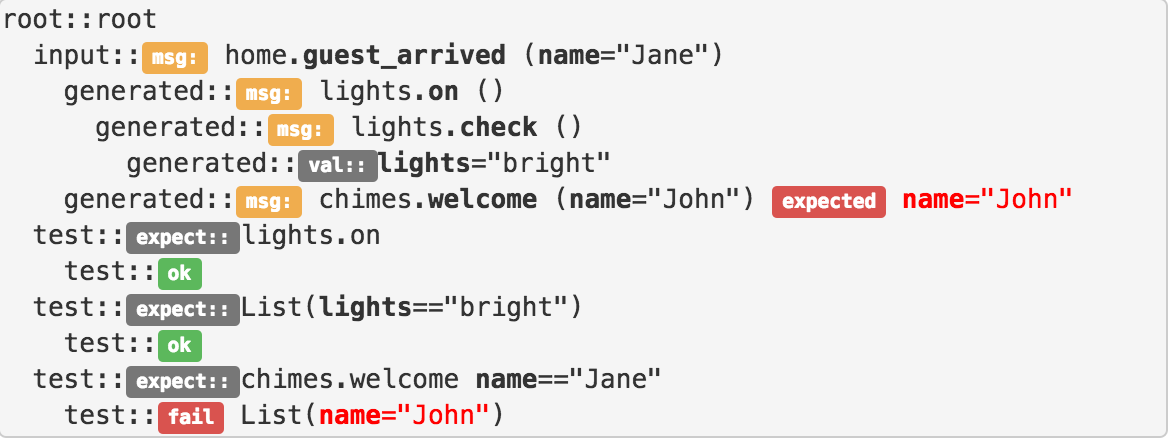Reactive rules and workflow DSL
An asynchronous, message-oriented workflow framework, driven by rules and layered on top of akka actors. The rules are based on pattern matching:
$when math.fact (n == 0)
=> (payload=1)
$when math.fact (n > 0)
=> math.fact (n=n-1)
=> (payload=payload * n)
See more details here:
- Language reference
- Expressions and pattern matching
- Towers of Hanoi example: spec and story
Testing
The testing framework relies on similar DSL constructs, to define tests and then a Guardian, to run these continuously.
$send math.fact (n=0)
$expect (payload == 1)
$send math.fact (n=5)
$expect (payload == 120)
See more details and technical notes at diesel.
Expressions
The expressions used in Diese are useful on their own: as an external DSL, the expressions are fairly complex (see more in expr), including lambdas, list operators and inlined Javascript expressions, such as:
// array/lists with lambdas etc
[1,2] + [3] filter (x=> x > 1) map (x=> x + 1)
// embedded JS, when you run out of constructs
js:{var d = new Date(); d.setSeconds(d.getSeconds() + 10); d.toISOString();}
See expr for details and info on using them on their own.
Execution traces
The "execution trace", a tree-like model is stored and can be retrieved to see what is going on, or what happened for a past request. This will represent, at all times, the current state of execution (some nodes may be async operations that we're waiting for etc).
Diesel Apps
Around the main Diesel DSL for reactive rules, we created an entire Scala DSL framework for developing domain and rules-driven reactive services and apps. Rapid mocking, prototyping, development, testing and hosting of (micro)services and websites, see The simplest micro-service you ever created
See it in action and go serverless at [DieselApps.com](http://www.dieselapps.com).
You can either use the DieselApps cloud, embed the rules or the entire framework in your app or run your own instances on-prem,
Components:
- diesel - the light reactive rules-based workflow engine
- expr - expressions and parsing
- tconf - TBD, for specs-driven logic
- dom - TBD, domain entities
- db - simple entity persistence layer for Mongo
- diesel-snakk - snakked on steroids: simple REST snakking, XML and JSON template parsing etc
- diesel-rest - mocking of REST services
- diesel-wiki - A domain-driven Markdown Wiki - the basis for configuration, text-first, with support for extensible DSLs
- diesel-play - the play code to make everything work as a website
Head over to the academy to read more!
Diesel-wiki
Domain driven markdown wiki. See more at Markup_and_DSL.
Versions and technologies
- scala 2.11
- akka 2.4, with akka-cluster etc
- play framework 2.4
Examples
Mock a simple REST API - see The simplest microservice you ever created:
$mock say.hi (name ?= "Jane") => (greeting = "Hello, " + name)
Test the simple REST API - see Simple microservices testing:
$send say.hi (name = "Jane")
$expect (greeting contains "Jane")
OR via the implicit REST API:
snakk.text (url = "http://specs.dieselapps.com/diesel/mock/say.hi?name=Jane")
$expect (payload contains "Jane")
The implicit REST API is implemented in Play Framework controllers, which you can include in your routes, see Routes.
Scala client - use as a rules library
You can use this library directly in your code, in several ways, see some samples or unit tests.
implicit val system = ActorSystem("testsystem", ConfigFactory.parseString(""" """))
// tell the engine to use this system
// tell the engine to use this system
DieselAppContext
.withSimpleMode()
.withActorSystem(system)
// make a DSL spec - the rules we will run
val spec = DieselTextSpec (
"spec_name",
"""
|$when home.guest_arrived => lights.on
|
|$when home.guest_arrived(name=="Jane") => chimes.welcome(name)
|
|$when chimes.welcome => (greeting = "Greetings, "+name)
|""".stripMargin
)
// make a story DSL - the starting sequence of events
val story = DieselTextSpec (
"story_name",
"""
|$send home.guest_arrived(name="Jane")
|""".stripMargin
)
// run it: create engine, run story and wait for result
val engine = DomEngineUtils.execAndWait(
DomEngineUtils.mkEngine(
new DomEngineSettings().copy(realm=Some("rk")),
List(spec),
List(story)
)
)
println(engine.root.toString) // debug trace of engine's execution
println(engine.resultingValue) // resulting value, if any
// test it
assert(engine.resultingValue contains "Greetings, Jane")



